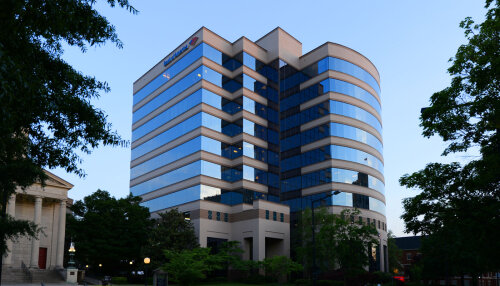Best Brain Injury Lawyers in Knoxville
Share your needs with us, get contacted by law firms.
Free. Takes 2 min.
List of the best lawyers in Knoxville, United States
About Brain Injury Law in Knoxville, United States
Brain injury law covers legal issues that arise after someone sustains a traumatic brain injury or acquired brain injury. In Knoxville, United States, these matters are handled under Tennessee state law and federal programs where applicable. Brain injuries can result from motor vehicle collisions, falls, workplace accidents, sports incidents, medical malpractice, assaults, and other traumatic events. Because brain injuries often cause long-term cognitive, physical, emotional, and financial impacts, legal claims typically focus on securing compensation for medical care, rehabilitation, lost wages, loss of earning capacity, and pain and suffering.
This guide provides an overview of common legal issues, when to consult an attorney, key local law considerations in Knoxville and Tennessee, frequently asked questions, useful resources, and recommended next steps for people seeking legal help after a brain injury.
Why You May Need a Lawyer
Brain injury cases are often technically complex and fact-intensive. You may need a lawyer in Knoxville if you face any of the following situations:
- Severe or lasting symptoms such as cognitive impairment, memory loss, personality changes, or physical disabilities that require ongoing treatment and long-term care planning.
- Disputes with insurance companies over coverage, claim denials, low settlement offers, or delays in payment for medical care and rehabilitation.
- Workplace injuries where workers compensation benefits may apply but may not fully cover long-term needs, or where a third party may be liable in addition to an employer.
- Injuries caused by medical negligence, such as delayed diagnosis or surgical error, where medical malpractice claims and special procedural requirements may apply.
- Injuries involving government entities or public transportation, which may involve special notice requirements and shorter filing deadlines.
- Situations where fault is disputed, or multiple parties may share responsibility, requiring investigation, expert testimony, and negotiation or litigation to resolve.
- Need for help documenting damages, calculating future care needs, and coordinating with rehabilitation specialists, vocational experts, and life-care planners.
Local Laws Overview
Tennessee law and court procedures will govern most civil claims arising from brain injury in Knoxville. Key legal aspects to understand include statute of limitations, comparative fault rules, workers compensation, medical malpractice rules, and how damages are calculated.
Statute of limitations - Tennessee has strict filing deadlines for civil claims. Time limits vary by claim type and can be relatively short compared with other states. Because deadlines can bar recovery if missed, it is important to consult an attorney promptly to determine the exact deadline that applies to your case.
Comparative fault - Tennessee uses a modified comparative fault approach. If a claimant bears some portion of fault, recovery may be reduced in proportion to the claimant's percentage of fault. In serious cases, if the claimant is found more at fault than permitted under state law, recovery may be barred.
Workers compensation - If a brain injury occurs at work or in the course of employment, workers compensation benefits generally provide medical care and partial wage replacement without proving fault. However, workers compensation benefits often do not cover full long-term needs, and there are procedural rules and notice requirements to preserve claims. In limited situations, a third-party lawsuit may be available in addition to workers compensation.
Medical malpractice - Brain injuries caused or worsened by healthcare providers may trigger medical malpractice claims. These claims often require specific pre-suit steps, such as written notice, expert evaluation, and compliance with filing requirements. Medical malpractice claims also can have different deadlines and procedural hurdles than ordinary negligence claims.
Damages and evidence - Injured persons may pursue recovery for economic damages such as medical bills and lost earnings, non-economic damages such as pain and suffering, and in some cases punitive damages for egregious conduct. Proving the extent of brain injury typically requires medical records, imaging, neuropsychological testing, rehabilitation documentation, and expert testimony about prognosis and future care needs.
Administrative and governmental claims - Claims against government entities, including municipal agencies, often require timely notice and compliance with specific statutes governing suits against public bodies. Missing these procedural steps can prevent a successful claim.
Frequently Asked Questions
What counts as a brain injury for legal purposes?
For legal purposes a brain injury can be any neurological harm caused by trauma, lack of oxygen, infection, stroke, or medical error that results in cognitive, physical, emotional, or behavioral impairment. Traumatic brain injuries often arise from a blow or jolt to the head while acquired brain injuries can result from events like strokes or medical negligence. The legal focus is on causation, diagnosis, and the injury's impact on function and life activities.
How soon should I see a lawyer after a brain injury?
See a lawyer as soon as reasonably possible. Early consultation helps preserve evidence, meet notice requirements, and protect your legal rights before deadlines expire. A lawyer can advise on immediate steps, investigation, and whether to pursue an insurance claim, workers compensation, or a lawsuit.
What deadlines apply to filing a claim in Knoxville?
Deadlines vary by claim type. Tennessee law imposes strict time limits on negligence, medical malpractice, wrongful death, and governmental claims. Because the exact deadline depends on the nature of the claim and specific facts, consult an attorney quickly to determine your filing period and any special procedural steps.
Can I recover compensation if I was partially at fault?
Possibly. Tennessee follows modified comparative fault rules so that a claimant who is partially at fault may still recover damages, but the recovery is reduced by the claimant's percentage of fault. If the claimant's fault is above a legal threshold recovery may be barred. An attorney can evaluate how comparative fault might affect your case.
What types of damages can I recover for a brain injury?
Potential recoverable damages often include past and future medical expenses, rehabilitation and therapy costs, lost wages, loss of future earning capacity, assistive devices, home modification costs, pain and suffering, emotional distress, and loss of enjoyment of life. In some cases punitive damages may be available for particularly reckless conduct. The exact damages depend on the facts and applicable law.
How do I prove a brain injury in court or to an insurer?
Proving a brain injury typically requires medical records, imaging studies, emergency and hospital reports, neuropsychological assessments, therapy and rehabilitation records, testimony from treating clinicians, and often expert witnesses who can explain how the injury happened and its long-term effects. Consistent documentation of symptoms and treatment is critical.
What if my brain injury happened at work - do I file a lawsuit?
If the injury occurred at work you should report the injury to your employer and file a workers compensation claim. Workers compensation generally provides medical treatment and wage benefits without proving employer fault. In some cases where a third party outside the employer is responsible, a separate civil lawsuit may be possible. Consult a lawyer to review both options and preserve rights under workers compensation and civil claims.
Are there special rules for brain injuries caused by medical care?
Yes. Medical malpractice claims have unique procedural requirements including expert reviews, certificates of good faith in some circumstances, specific notice periods, and different statutes of limitation. Medical malpractice litigation can be complex and usually requires medical experts to establish negligence and causation. Quick legal evaluation is important to meet pre-suit obligations and deadlines.
How long do brain injury cases usually take to resolve?
Case length varies widely. Minor cases may settle in months while complex cases involving catastrophic injury, multiple defendants, or disputes over liability and damages can take years. The need for long-term care planning and expert opinions about future costs often extends case timelines. Your attorney should provide an estimate based on your specific situation.
Should I accept the insurance company settlement offer?
Insurance companies often make early offers that may not fully reflect the long-term costs of a brain injury. Before accepting any offer consult an attorney and make sure you understand current and projected medical expenses, rehabilitation needs, lost future earning capacity, and non-economic damages. An attorney can evaluate the offer and negotiate on your behalf to pursue fair compensation.
Additional Resources
If you need support beyond legal help consider these types of organizations and agencies in Knoxville and Tennessee that assist people with brain injuries or help navigate claims and benefits:
- State agencies such as the Tennessee Department of Health and any state Traumatic Brain Injury program that provides case management and resource referral.
- Tennessee Bureau of Workers Compensation for questions about workplace injury benefits and procedures.
- Brain Injury Association of Tennessee and local support groups that offer education, advocacy, and connections to services for survivors and families.
- Brain Injury Association of America and other national organizations that provide information on rehabilitation, caregivers support, and best practices.
- Social Security Administration for disability benefits including Social Security Disability Insurance and Supplemental Security Income when injuries impair work capacity.
- Local hospitals and rehabilitation centers in Knoxville that specialize in brain injury care for diagnosis, treatment, and life-care planning.
- Knoxville Bar Association or local lawyer referral services for finding attorneys experienced in brain injury, personal injury, workers compensation, and medical malpractice.
Next Steps
If you or a loved one has experienced a brain injury in Knoxville take these steps to protect health and legal rights:
- Seek immediate medical attention and follow through with all recommended care and rehabilitation. Your medical records are critical evidence.
- Preserve evidence such as photos, incident reports, witness names and contact information, workplace injury reports, and any equipment involved.
- Report the incident to the proper authorities or your employer as required. File necessary insurance claims and workers compensation reports promptly.
- Avoid giving recorded statements to insurance adjusters or signing releases before consulting an attorney. Be cautious with social media posts about the injury or recovery.
- Contact an experienced Knoxville attorney who handles brain injury, personal injury, workers compensation, or medical malpractice cases for an initial consultation. Bring medical records, accident reports, and insurance information to the meeting.
- Ask potential attorneys about their experience with brain injury cases, how they investigate claims, how they work with medical and life-care experts, fee structures, and how they will communicate with you through the case.
Early legal evaluation can clarify your options, ensure important deadlines are met, and help you focus on recovery while professionals handle investigation and negotiation on your behalf.
Lawzana helps you find the best lawyers and law firms in Knoxville through a curated and pre-screened list of qualified legal professionals. Our platform offers rankings and detailed profiles of attorneys and law firms, allowing you to compare based on practice areas, including Brain Injury, experience, and client feedback.
Each profile includes a description of the firm's areas of practice, client reviews, team members and partners, year of establishment, spoken languages, office locations, contact information, social media presence, and any published articles or resources. Most firms on our platform speak English and are experienced in both local and international legal matters.
Get a quote from top-rated law firms in Knoxville, United States — quickly, securely, and without unnecessary hassle.
Disclaimer:
The information provided on this page is for general informational purposes only and does not constitute legal advice. While we strive to ensure the accuracy and relevance of the content, legal information may change over time, and interpretations of the law can vary. You should always consult with a qualified legal professional for advice specific to your situation.
We disclaim all liability for actions taken or not taken based on the content of this page. If you believe any information is incorrect or outdated, please contact us, and we will review and update it where appropriate.












